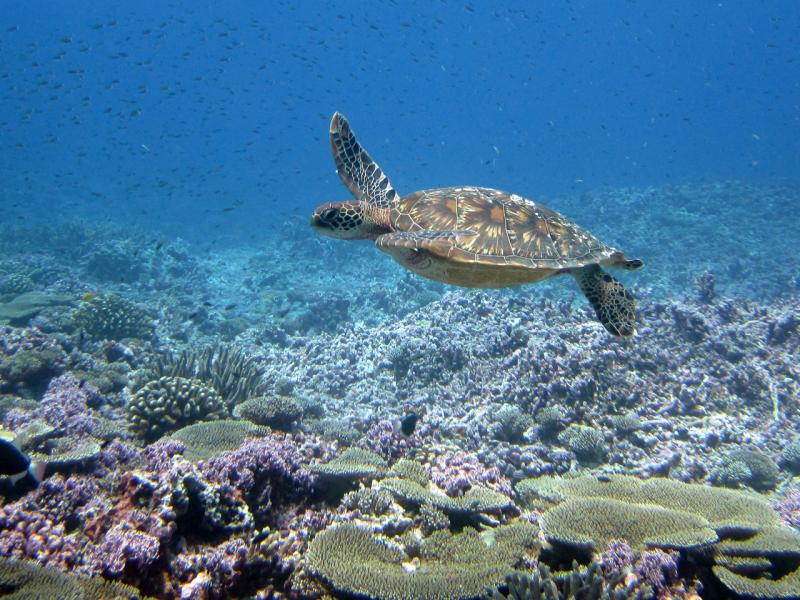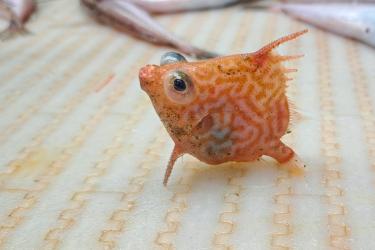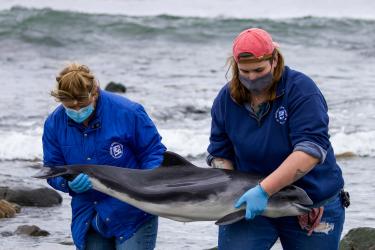Let's dive into Sea Turtle Week! This week-long celebration of sea turtle conservation is centered around World Sea Turtle Day on Thursday June 16. This year our celebration highlights the impact of climate change on sea turtles, how sea turtles hear and why understanding their hearing is important, and what you can do to protect sea turtles.
There are seven species of sea turtles in the world. Six of them live in U.S. waters: hawksbill, loggerhead, olive ridley, Kemp’s ridley, green, and leatherback sea turtles. All of these species are listed and protected under the Endangered Species Act. NOAA Fisheries leads the conservation and recovery of sea turtles in the marine environment. Most sea turtle species face similar threats from human impacts.
NOAA Fisheries Conserves Sea Turtles
Sea turtles can become trapped, hooked, or entangled in fishing gear, most commonly in trawls, longlines, and gillnets. This is called bycatch and is the greatest threat to sea turtles in the United States. NOAA Fisheries is committed to reducing bycatch to protect and conserve sea turtles. We are actively working to reduce their primary threats and help turn the tide toward recovery.
- In the southeast Atlantic and Gulf of Mexico, we have worked closely with the trawl fishing industry to develop turtle excluder devices (TEDs) to reduce the mortality of sea turtles caught in shrimp trawl gear, where they can drown.
- In the Hawaii and California-based pelagic longline fisheries and the California and Oregon drift gillnet fishery, we require certain measures, including fishing gear modifications, changes to fishing practices, and fishing closures during certain times and in certain areas to reduce sea turtle bycatch.
- As sea turtles are highly migratory across ocean basins and given NOAA Fisheries’ jurisdiction in the marine environment, a significant portion of our work is focused on mitigating sea turtle bycatch in commercial and recreational fisheries internationally.
How You Can Help Protect Sea Turtles
We need you to help save sea turtles! Here’s how you can protect sea turtles:
Become a Conscious and Responsible Seafood Consumer
Ask where and how your seafood was caught. Choose seafood caught in ways that do not harm or kill turtles. Consult sustainable seafood information networks to learn about how and where your seafood is caught.
Watch for Sea Turtles in the Water
Give them at least 50 yards of space. If you see them close by, put your engine in neutral to avoid harm. Viewing guidelines and laws vary by region, state, and species. Please be familiar with the applicable rules before you visit our coastal waters. Boat strikes are a serious threat to sea turtles, so slow down, keep a watchful eye out, and steer around them. Remember: Go Slow: Sea Turtles Below!
Dispose of Trash Properly on Land
Sea turtles can ingest plastics and other debris and be injured or killed. Recycle whenever possible and use alternatives to single-use plastics. Never abandon fishing gear. Hooks, lines, or nets left in the water can entangle and kill sea turtles
Report Turtles In Distress
Contact your local sea turtle stranding network if you see a sick or injured sea turtle. Do not try to help the sea turtle on your own. Reporting a sick, injured, entangled, stranded, or dead animal is the best way to make sure professional responders and scientists know about it and can take appropriate action.
Kim Damon-Randall
Director of NOAA Fisheries Office of Protected Resources



